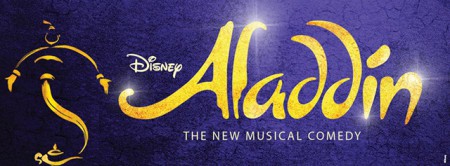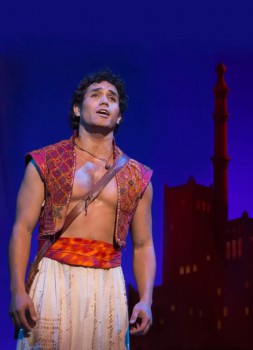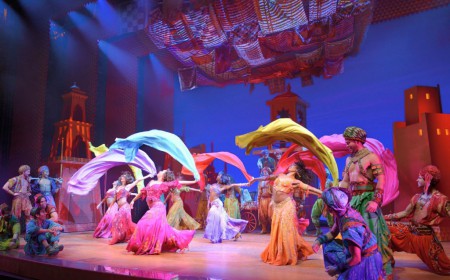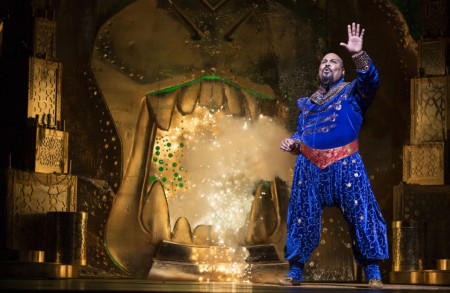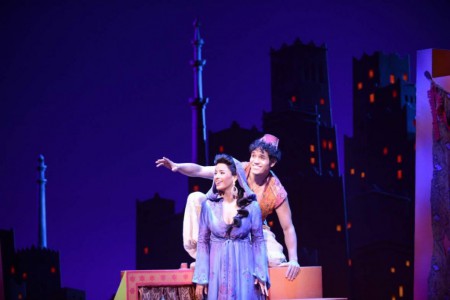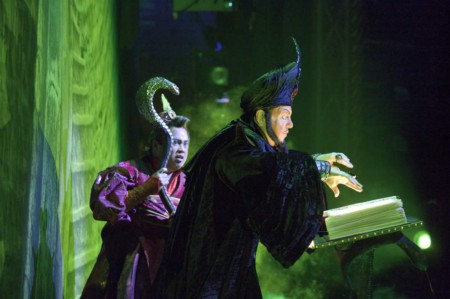‘Aladdin – The New Musical Comedy’ Review
Among the pantheon of Disney animated classics, there are only a handful that obviously lend themselves to a theatrical experience worth the high-ticket price of a night at the theater. After more than twenty years of experience dazzling audiences on the “great white way,” Disney Theatrical has selected one of the more obvious titles as their eighth Broadway musical, Aladdin… also known as Al, Laddie, or just Din.
Everyone’s favorite Agrabahrian thief took more than twenty years to make it to the world’s premier theater location. It was a natural choice for development following the smashing success of Beauty and the Beast, which debuted on Broadway in 1994, but production challenges and other projects kept pushing it back. After several attempts at licensed productions (which featured some of the cast of this production) Disney tried a more sophisticated show in Seattle and it is this production that has more-or-less found its way to NYC.
The beauty of developing Aladdin for the theater is that Alan Menken and Howard Ashman’s original treatment for the film, which was deemed too theatrical, could be resurrected. Aladdin is joined on stage by his three best friends (Babkak, Omar, and Kassim) and is trying to live up to the expectations of his recently deceased mother. Both additions to the show allow some of the cut Menken/Ashman songs to be restored, and “Proud of Your Boy” becomes one of the songs that you’ll be humming as you exit the theater.
Chad Beguelin was working for Disney Theatrical on a script that could be licensed for school productions when Menken got involved to take the show to Broadway instead (it’s the same formula that worked so well in 2012 with Newsies, which is still going strong on Broadway and on tour). The expanded script required several new songs to be added, with Beguelin serving as lyricist for these new pieces. Menken’s newer songs have felt somewhat lacking in recent Disney shows. For The Little Mermaid, new songs were either score from the film that never had lyrics or felt like forced additions. Newsies had a few strong new numbers, but most of the added score was unmemorable. I was surprised that the newest songs in Aladdin are a return-to-form for the star composer of Disney’s second golden age. Songs like “Somebody’s Got Your Back,” “High Adventure,” and “These Palace Walls” hold their own against the classic songs from the film and the cut songs that have been revived.I’ve seen shows in six other Broadway theaters, but none of them are as exquisite as Disney’s New Amsterdam, which received some TLC during the gap between Mary Poppins closing and Aladdin opening. The opulent setting made getting there early all the more grand. As the overture played, lights made the magic carpet curtain vibrantly change colors before it flew away to reveal the fourth-wall-breaking Genie who kicked off the show with “Arabian Nights.” The theatrics used in Aladdin are some of the most impressive I’ve ever seen and give all of the previous Disney shows a run for their money.
Agrabah is created on stage with a series of rotating, transforming columns that can grow bigger and smaller to make it seem like Aladdin is really traveling through a city during the big number, “One Jump Ahead.” His character has his “I want” moment with the heart-pouring ballad “ Proud of Your Boy,” which becomes his recurring theme for the rest of the show. At the gorgeous palace, Jasmine wishes to live “Beyond These Palace Walls” and be free from her royal constraints. Meanwhile, the villainous Jafar and his mini-servant Iago discover that they need the “Diamond in the Rough” to find the Genie’s lamp to grant Jafar’s wish of becoming sultan.After a brief meeting between Aladdin and Jasmine in the marketplace where they both wish to be “A Million Miles Away,” Aladdin is taken by Jafar to the Cave of Wonders where he accidentally gets trapped inside with the Genie. This performance of “Friend Like Me” is the real highlight of the show, and the reason that James Monroe Iglehart is nominated for a Tony for this role. The song has been expanded to over seven minutes for this incredible performance. At our show on May 29th, he received a standing ovation and the applause lasted for at least a minute (it was a bigger applause than the show received at the end). Act 1 ends with Aladdin wishing to become a prince and a reprise of “Proud of Your Boy.”
After an intermission filled with soda in a collectable cup and a bag full of $70 worth of must-have merchandise, the show resumed with “Prince Ali” arriving at the palace in a spectacle-filled procession (sadly, it did not come through the audience as I expected it would). This number also features one of several jokes to the fact that Abu is absent from the show. After getting off on the wrong foot with the princess, Ali is able to impress her by showing her “A Whole New World” on his magic carpet. By the way, the magic carpet ride is done so well that wires are impossible to see and goosebumps were on every audience member’s arms.Shortly after Jasmine falls for Prince Ali, he is arrested by Jafar for trespassing in the princess’ private quarters and locked in the dungeon. Omar, Babkak and Kassim face “High Adventure” when they try to free him, but end up locked in the dungeon instead. When they release the Genie in their cell, they realize the importance of friendship when “Somebody’s Got Your Back.” Prince Ali is revealed to be Aladdin after Jafar steals the lamp, but Aladdin outsmarts him by convincing him to wish to be a Genie and locking him inside his own lamp. After making good on his promise to free the Genie, Aladdin and Jasmine are married and share their whole new world of happily ever after.
Most Broadway shows will fall flat if their lead character isn’t strong. Adam Jacobs’ performance as Aladdin was exactly what you would expect, with the physicality and singing-ability to portray the lovable thief. However, the real stars of the show are the supporting cast, which are expertly cast in the original Broadway production. If future replacements are weak, it is obvious that the show will fall apart even if Aladdin gives a solid performance. The true highlight of the show is the Genie, with James Monroe Iglehart so hilarious and lovable that you’ll never forget him. Jafar is expertly played by the original voice actor, Jonathan Freeman, and Omar, Babkak and Kassim are so fun as Aladdin’s sidekicks that you tend to miss them when scenes have gone too long without them.When a show like Aladdin does so many things right, it’s hard to find much fault in it. My only issue with the show is that the ending felt very rushed. So much so that they failed to linger on the moment where the Genie is freed, which is the emotional core of the film. On this trip to Manhattan, I saw three shows and while Aladdin was the most impressive, it’s also the only one that didn’t strike a deep emotional chord with me (outside of the first performance of “Proud of Your Boy”). This greatly surprised me since I am pre-programmed to automagically be sentimental to anything Disney. However, if you can afford the high ticket price and are able to actually find tickets to this sold out show, you will not be disappointed in the slightest by this spectacular production.
I give Aladdin 4.5 out of 5 magic lamps.
Alex is currently watching and reviewing all of Disney’s films in chronological order. You can follow along here.

